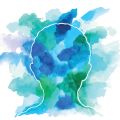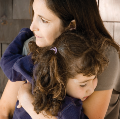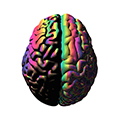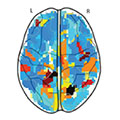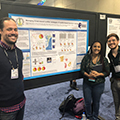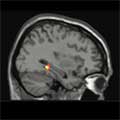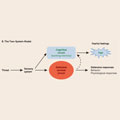Science News About Anxiety Disorders
- Intervention Reduces Likelihood of Developing Postpartum Anxiety and Depression by More Than 70%
-
Results from a large clinical trial funded by the National Institutes of Health show that an intervention for anxiety provided to pregnant women living in Pakistan significantly reduced the likelihood of the women developing moderate-to-severe anxiety, depression, or both six weeks after birth.
- Cognitive Behavioral Therapy Alters Brain Activity in Children With Anxiety
-
Researchers at the National Institute of Mental Health found that unmedicated children with anxiety disorders show widespread overactivation in brain functioning and that treatment with cognitive behavioral therapy led to a clinically significant drop in anxiety symptoms and improved brain functioning.
- Mothers' Difficult Childhoods Impact Their Children’s Mental Health
-
In this NIMH-funded study, researchers examined how trauma gets passed from one generation to the next.
- Brain Activity Patterns After Trauma May Predict Long-Term Mental Health
-
The way a person’s brain responds to stress following a traumatic event, such as a car accident, may help to predict their long-term mental health outcomes, according to NIMH-supported research.
- Assessing Suicide Risk Among Childbearing Women in the U.S. Before and After Giving Birth
-
NIMH-supported researchers investigated suicide risk among women in the year before and year after giving birth.
- Study Identifies Risk Factors for Elevated Anxiety in Young Adults During COVID-19 Pandemic
-
A new study has identified early risk factors that predicted heightened anxiety in young adults during the coronavirus pandemic.
- Infant Temperament Predicts Personality More Than 20 Years Later
-
Researchers investigating how temperament shapes adult life-course outcomes have found that behavioral inhibition in infancy predicts a reserved, introverted personality at age 26 and for some, a risk of internalizing psychopathology such as anxiety and depression.
- Fast-Fail Trial Shows New Approach to Identifying Brain Targets for Clinical Treatments
-
An innovative NIMH-funded trial shows that a receptor involved in the brain’s reward system may be a viable target for treating anhedonia (or lack of pleasure), a key symptom of several mood and anxiety disorders.
- Developing Rapid, Accurate Assessment of Mental Disorders, Suicide Risk in Youth
-
For many adults who have a mental disorder, symptoms were present—but often not recognized or addressed—in childhood and adolescence. Early treatment can help prevent more severe, lasting impairment or disability as a child grows up.
- NIH Study Reveals Differences in Brain Activity in Children with Anhedonia
-
Researchers have identified changes in brain connectivity and brain activity during rest and reward anticipation in children with anhedonia, a condition where people lose interest and pleasure in activities they used to enjoy.
- Puerto Rico’s “Fear Lab” Mentors Neuroscience Rigor amid Diversity
-
A lineage of young neuroscientists from diverse backgrounds trace their scientific roots to a “fear lab” in Puerto Rico that the National Institutes of Health has been supporting for two decades.
- Webinar: RDoC - Fear & Anxiety: From Mechanisms to Implementation
-
This November 2016 RDoC webinar highlights the role of fear and anxiety in disorders such as phobias and depression.
- Pediatrics-based Brief Therapy Outdoes Referral for Youths with Anxiety and Depression
-
A streamlined behavioral therapy delivered in a pediatrics practice offered much greater benefit to youth with anxiety and depression than a more standard referral to mental health care with follow-up in a clinical trial comparing the two approaches.
- Estrogen Alters Memory Circuit Function in Women with Gene Variant
-
Brain scans reveal that fluctuations in estrogen can trigger atypical functioning in a key brain memory circuit in women with a common version of a gene. Since working memory function is often disturbed in mental disorders, such gene-hormone interactions are suspect mechanisms that may confer risk.
- Circuitry for Fearful Feelings, Behavior Untangled in Anxiety Disorders
-
Untangling the brain circuitry of fearful feelings from that underlying defensive behaviors is key to improving treatments for anxiety disorders, argue two leading experts.
- Webinar Series – Office for Research on Disparities and Global Mental Health
-
View the archived webinars with NIMH experts and grantees, which focus on training, research, and methodology
- Twitter Chat on Cancer and Psycho-Oncology
-
NIMH and NCI host a Twitter chat on how patients and caregivers, across all ages, can deal with the psychological impact of cancer.
